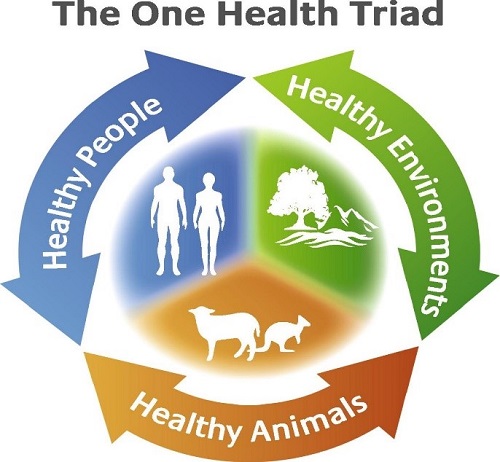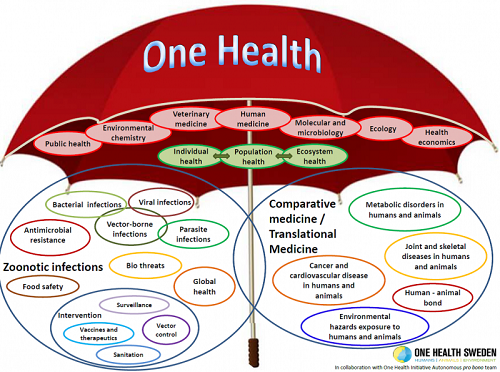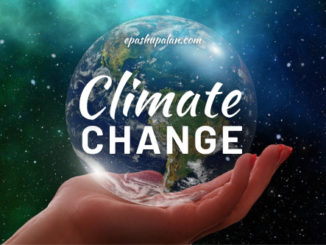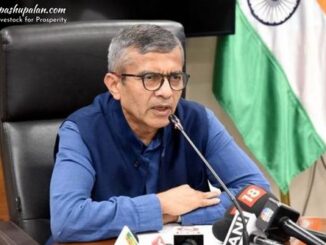“Healthy citizens are the greatest asset any country can have” ~Winston Churchill~
Johne Donne stated human is a social animal 400 years ago as it needs a certain society like animals and environment for its survival, making one health concept a vital area to be looked for. It generally refers to the interaction between these three communities and also involves various expert opinions from different fields like medicine, ecology, animal health, epidemiology, etc at local, national and global levels.
The term ‘One Health’ was coined by Calvin Schwabe in 1976 and it promotes systematic collaboration between veterinarians, physicians and others in order to emphasize on various pathogen associated problems in changing environment. This concept was earlier referred as ‘One Medicine’ but later evolved to one health concept based on practical implementation and their importance for global animal and public health.

It is not a new concept; the realization of its significance arose because of poor sanitation and emergence of various zoonotic diseases in the ancient era like small pox, tuberculosis etc. In recent years massive population growth, rapid urbanization, intrusion of ecosystem e.g. deforestation because of globalized trading and trafficking has added to its further importance. Thus, it is not wrong to say that-
It’s a global movement for challenge driven team work.
The concept of one health involves a number of national and state medical agencies and organisations like Centre for Disease Control (CDC), World Health Organization (WHO) and American Medical Association (AMA). This calls for the formation of student one health interest groups involving several medical schools, health centres, veterinary clinical complexes that focusses on approaches towards research and education. It enables the development of various diagnostic methods, vaccines and other measures to prevent future pandemics like the recent corona one. This ultimately benefits the patients and promotes the sustainable development thereby improving environmental conditions for the benefit of biodiversity.

According to a report every 6 out of 10 infectious diseases in people are caused by animals like rabies, West Nile virus, Lyme’s disease, Bubonic plaque, Salmonellosis, etc. possess public health threat. Thus, the importance of reducing zoonotic risk in farms should be the priority for both human and animal health. This also requires a close collaboration between public health workers, veterinarians and occupational health professionals.
According to the world bank reports for influenza pandemic-
Level of pandemic Reduction in GDP (approx.)
Low 1%
Moderate 2%
Serious 5%
The above table indicates that this pandemic led to severe economic loss which is also evident during recent Covid 19 pandemic where global growth of $ 9 trillion was found to be affected in the subsequent 2 years.
Sustainable developmental goals refers to the importance of ensuring healthy environment for the survival of people and animals along with developmental goals. It requires far sighted approach involving several implementation policies and programmes at local, regional, national and state level. It can give fruitful results and can be more beneficial when supported by any government agencies.
Several emerging infectious diseases like West Africa Ebola virus that resulted in high mortality and economic losses shows a need for effective strategies to deal, predict and respond to such outbreaks of international concern. Nowadays, emergence of antimicrobial resistance is also a concern that requires proper surveillance for preventing endemic zoonotic diseases like Brucellosis, Tuberculosis etc.
SARS CoV- 2 virus originated from China in December 2019, led to the situation where the whole world got on knees. This pandemic clearly shows how government involvement led to the control of this havoc by large production of vaccines for immediate use. This pandemic not only impacted the economics but also led to the severe loss of human lives. Even the idea of another pandemic could not be imagined in our worst dreams. Thus, there is a need to prepare ourselves to respond to any such situations by developing certain public health programmes, policies, recognizing research gaps etc.
In the present scenario there is still a lot that is out of control particularly protection of wildlife species, community ecology and several related ecological issues that are still neglected. The simple understanding of zoonotic risk and toxic substances cannot solve the problem. It is important to consider the diversity, liabilities, susceptibilities of human beings and also different ways of their interaction with animals and environment. The basic knowledge of plant ecology and epidemiology has also played an important role. The best example of it is- interference of RNA that alters the gene regulation acting as a barrier for the entry of various plant inhabitants that are responsible for food contamination ultimately affecting the human health. One health concept is far beyond science and impact politics, laws and ethics. Although, it is an old concept but still has a long road to go ahead.






Be the first to comment